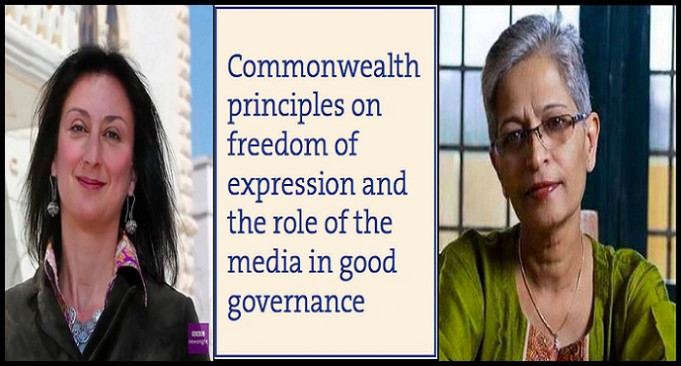“Stop killing journalists in the Commonwealth”
Daphne Caruana Galizia (left) and Gauri Lankesh
Armed with the chilling figure from UNESCO that 57 journalists have been killed for doing their work in Commonwealth countries in the five years between 2013 and 2017, six Commonwealth organisations have come out with a 12-point Commonwealth code of conduct to protect journalists and media freedom.
As the leaders of 53 Commonwealth countries, including Narendra Modi, arrive to attend the Commonwealth Heads of Government Meeting in London on April 19-20, the code is aimed at getting countries to reduce the heavy toll of journalists’ killings and other threats to the media’s fundamental right to report.
“Media freedom is hard won and needs constant vigilance and active defence”, said Dr Sue Onslow, Deputy Director of the Institute of Commonwealth Studies (ICWS), who opened a meeting to mark the publication of the Commonwealth Principles on Freedom of Expression and the Role of the Media in Good Governance at the University of London’s Senate House according to a press release from the Commonwealth Journalists Association (CJA).
The release mentioned that among the widely reported cases in 2017 were the killing of editor and journalist Gauri Lankesh in India in September and the car bombing in October that killed investigative journalist Daphne Caruana Galizia in Malta which, ironically, happens to be the current chair-in-office of the Commonwealth.
In both cases the killers are yet to be found. Both killings are seen as supari killings where the actual mastermind is behind the scenes. Attacks against women journalists have been climbing and the latest attack was on April 17 when unidentified persons riding motorcycles threw three petrol bombs at the residence of the editor of The Shillong Times, Patricia Mukhim. She escaped unharmed.
UNESCO’s statistics show that fewer than ten percent of all killings of journalists in Commonwealth countries have resulted in those responsible being brought to justice. Human rights groups say that the high rate of impunity is at odds with the Commonwealth’s commitment to the rule of law and protecting the media.
“Media freedom is in peril’, said Mahendra Ved, President of the CJA. “The Commonwealth should now demonstrate the will to defend it through actions, not just words. I believe these guidelines can help to make the commitments real.”
Apart from condemning the high number of targeted killings of journalists in Commonwealth member states, media and press freedom organisations have called for coordinated action to combat numerous cases of abduction, violent assault, criminal prosecution and arbitrary closures of media outlets.
William Horseley, one of the co-authors of the code, along with Dr David Page, wrote in an article titled: The Commonwealth: Where Being a Journalist Can Kill You:“Commonwealth governments have evaded the chorus of demands for them to take determined actions to confront the pattern of violent assaults and other arbitrary actions aimed at silencing journalists and news media whose role is to inform the public.
‘The London summit is the right time for them to put this on their agenda. Luckily the Commonwealth has vigorous civil society organisations which already monitor cases of violence and intimidation against journalists and others who document abuses of civil and political rights.
‘The Commonwealth Charter gives a mandate for strong action - despite the reluctance of some member states - by acknowledging the ‘surge in popular demands for democracy and human rights’.
Horseley is a passionate campaigner for media freedom on the global stage. Both he and Page are former BBC journalists and presently fellows at ICWS.
“The record of Commonwealth countries concerning the rising number of killings of journalists - whose work holds a mirror up to the societies they live in - points to a dismal failure by the authorities in some member states to protect the lives of journalists targeted for their work. Five years up to the end of 2017: Pakistan 23, India 18, Bangladesh 8, Nigeria 3, and one each in Kenya, Malta, South Africa, Tanzania and Uganda. UN statistics also show that in all but a few cases the killers are shielded from facing justice by a climate of judicial impunity. Where is the ‘rule of law’ in that?” questions Horseley.
Journalists, academics, parliamentarians, lawyers, legal educators and human rights advocates across the Commonwealth who constituted a working group drew up the Commonwealth Principles on Freedom of Expression and the Role of the Media in Good Governance. The document reflects international standards and best practice with regard to the relationships between the media and the three branches of government, effective protection for the independence of the media and its role in informing the public, the media’s respect for accuracy and fairness, and promoting member states’ observance of the principles.
The principles are to be found here.
Last year, Commonwealth Secretary-General Patricia Scotland said that the number of journalists killed for doing their jobs represented “a serious indictment of our collective efforts to build a safer and more inclusive future.”
The Commonwealth Summit is presently taking place in London from 16-20 April.
Nupur Basu is a journalist, documentary filmmaker and Executive Producer of Velvet Revolution.
